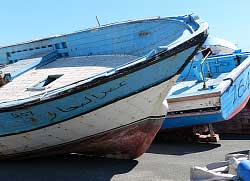Search
Coventry-led study seeks to unravel Mediterranean migration crisis
Thursday 01 October 2015
Press contact
 Coventry University is playing a leading role in a £1 million initiative to carry out urgent research into the ongoing migrant and refugee crisis which is gripping Europe.
Coventry University is playing a leading role in a £1 million initiative to carry out urgent research into the ongoing migrant and refugee crisis which is gripping Europe.
An international team led by Professor Heaven Crawley from the Centre for Trust, Peace and Social Relations (CTPSR) is travelling to the Mediterranean region to conduct the first large-scale comparative study of the backgrounds, experiences, aspirations and routes of migrants in four European countries – Italy, Greece, Malta and Turkey.
The project is part of the 'Mediterranean Migration Research Programme' which has been established through the Economic and Social Research Council's (ESRC) £1 million 'Urgency Grant', and is co-funded by the UK's Department for International Development (DfID).
Findings from the study – which is one of eight being funded through the ESRC grant – will be used to inform the development of policy and responses by governments, European agencies, and charities.
The Coventry-led study is bringing together some of Europe's leading experts† on the dynamics of migration and EU migration policy responses, and will directly address key questions which are currently vexing European policymakers and politicians, including:
- What are the underlying factors shaping migration from countries of origin, and how do the characteristics and backgrounds of migrants shape the journey to Europe?
- What are the differences between the Central Mediterranean (principally from Libya to Italy and Malta) and Eastern Mediterranean (Turkey to Greece) migration routes?
- What are the impacts of policies intended to deter or prevent migrants from crossing the Mediterranean?
Commenting on the need for the research, Professor Crawley said:
Much has been said by politicians and policymakers about the causes of the current migration crisis and the reasons why people move, but there is very little systematic analysis of the dynamics of migration in the region or the complex factors that influence the decisions made by individual migrants and the journeys that they take.
The research engages directly with those who have the greatest knowledge about the current situation – migrants themselves – to explore the reasons for the increase in the numbers of migrants arriving into Europe since the beginning of 2015. It will also investigate the factors that influence and inform the decisions made by those who have made the journey, and the role of social networks and a range of agents who are known to facilitate the migration process.
This information will enable us to better understand the different routes that migrants take – and why – including the ways these routes change in response to policies implemented by EU member states. We hope that this evidence will contribute towards improvements in the current policy response and a more informed public and political debate on migration to Europe.
Craig Bardsley, head of international development research at ESRC, said:
Given the unprecedented levels of migration across the Mediterranean this spring and summer, and the catastrophic death toll that resulted, there was an urgent need for new research to better understand the dynamics and drivers of the crisis.
With highly vulnerable people in the midst of a complex international crisis, there is an important role for highly trained, independent social scientists to gather accurate, reliable data. We hope this research programme will make a critical contribution to the evidence to support an effective policy response.
The research team – which also includes experts from the universities of Oxford and Birmingham – will be travelling to Italy, Greece, Malta and Turkey to collect evidence from more than 500 migrants and 100 stakeholders between now and January 2016. They will present their initial findings to policymakers and politicians in the Spring, with a final report due to be published in September 2016.
For further information, please contact Alex Roache, external press and media relations officer, Coventry University, on +44 (0)24 7765 5050 or email alex.roache@coventry.ac.uk. Alternatively, contact Simon Wesson, ESRC press officer.
NOTES TO EDITORS
†The research team comprises Professor Heaven Crawley (Chair in International Migration), Dr Katherine Jones (Senior Research Fellow) and Dr Simon McMahon at Coventry University's CTPSR, together with Dr Franck Duvell at the Centre on Migration, Policy and Society (COMPAS) at the University of Oxford and Dr Nando Sigona at the Institute for Research into Superdiversity (IRiS) at the University of Birmingham. The research will be undertaken in collaboration with international partners based in Italy (FIERI), Greece (ELIAMEP), Malta (People for Change Foundation) and Turkey (Yaser University).






